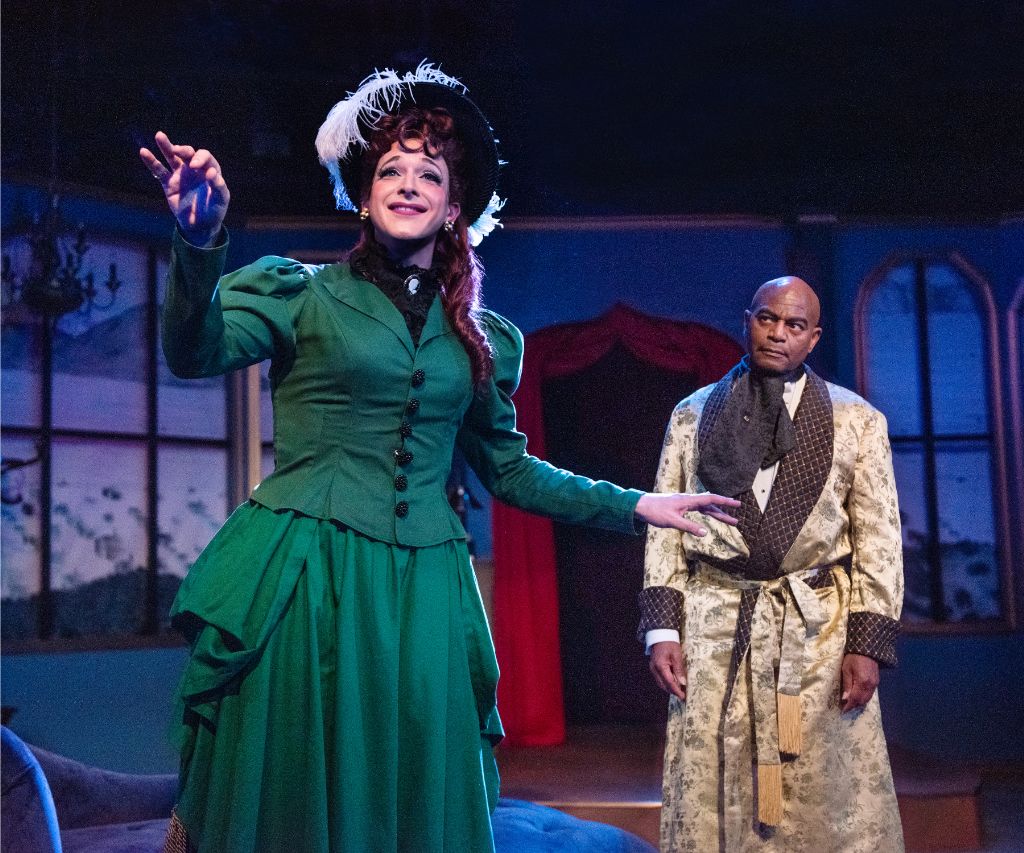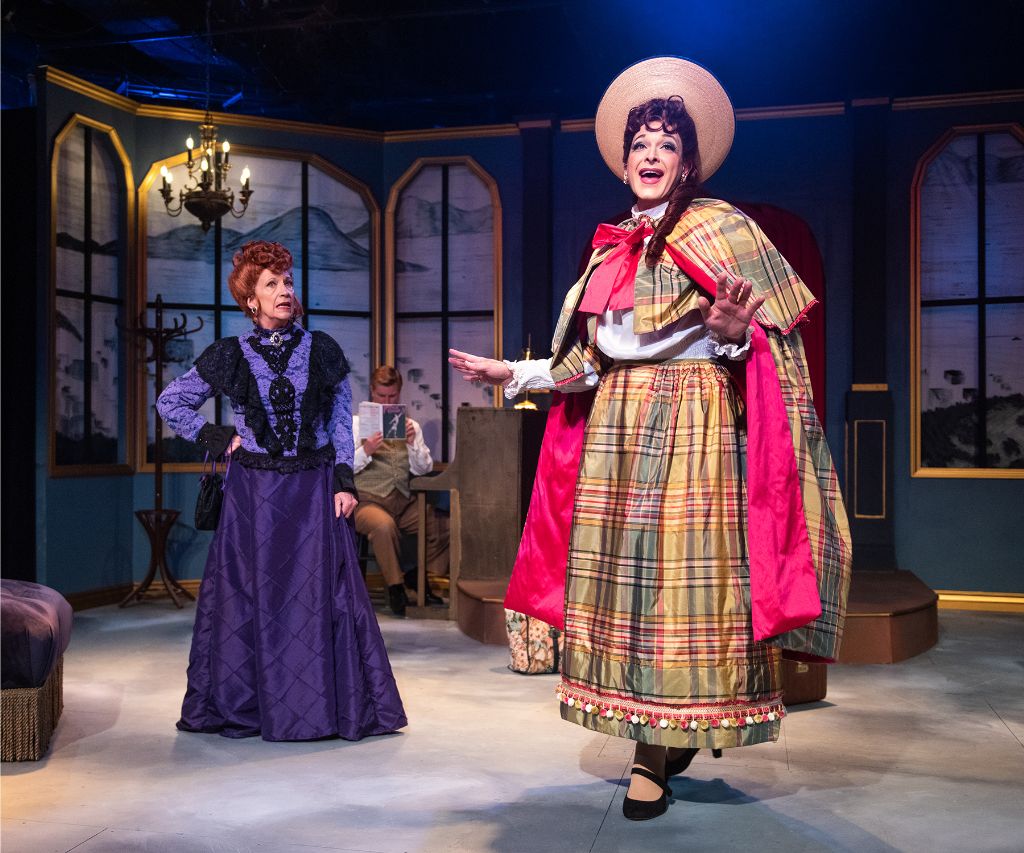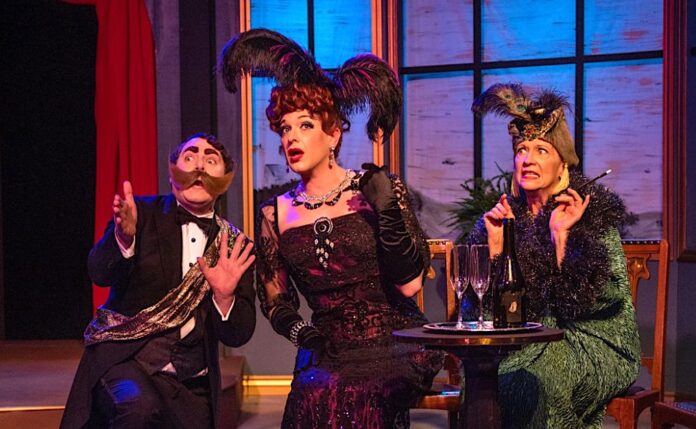There’s something perfect about seeing a drag show at the start of Pride Month. Not only do I get to see this one in “The Gayest City in America” (which also happens to be the story’s setting), but one being produced by the company that was born in SF the same year I was, the one pushing back against drag bans by setting up their own bawdy version of drag queen storytime. Add in another genre-spoofing script from the guy behind Psycho Beach Party and I’m an easy sell for this show.
And yet, the West Coast premiere production of Charles Busch’s The Confession of Lily Dare (through June 11 at the New Conservatory Theatre Center, SF) doesn’t quite add up the way it should. In typical Busch form, it lampoons the overwrought melodramas of Old Hollywood—the ones notoriously worshipped and simultaneously mocked by devout gay audiences for decades—by playing up the caricature archetypes of the cast. Growing up, most of us who fancied ourselves film buffs were afraid to heckle these films, lest we be accused of a lack of reverence. Busch carries on the long tradition of queer camp, understanding that you can laugh at and adore something at the same time. It lets audiences in on the joke by letting them laugh when need be.
The problem with this production is that it doesn’t seem to want audiences to laugh enough. Director F. Allen Sawyer often plays the melodrama very straight, attempting to mine real pathos out of the crowd assembled in the Decker Theatre. The result is like trying to remake Blazing Saddles as if it were Shane.
The story, told in flashback, tells of the life and death of the titular Ms. Dare (J. Conrad Frank, aka drag mainstay Katya Smirnoff-Skyy, at his most Busch-like). She begins as a naïve-but-educated young orphan come to live with her madam aunt (Marie O’Donnell) in her San Francisco brothel. Young Lily dreams of becoming a professional diva and, against the wishes of her aunt, occasionally works her pipes on the brothel’s cabaret stage. Eventually, she catches the eye of an innocent young man working at the house of ill repute (Kalon Thibodeaux) as well as one of the establishment’s more affluent patrons (LaMont Ridgell), whose intentions for Lily are less than honorable. All of this is set against the backdrop of a certain bayside city about to experience a major early-century shake-up, in more ways than one.

All the parts are there: a game cast; classic tropes and clichés; the old-time setting being an excuse for classic piano tunes; and some choice zingers from Busch (my favorite probably being the one about the consistent need for a pianist who plays “Ragtime”). Yet, Sawyer lets in too much air between many of the lines, often robbing them of the rat-a-tat-tat vocal rhythm signature to both Old Hollywood and Busch’s previous work. The lines have to come one after another, only stopped for specific (melo)dramatic stings. By having his cast play almost everything dead serious, Sawyer left much of the audience a bit confounded as to how they were supposed to feel at any given moment. They were clearly there for a laugh riot, but a lot of it played like Sophie’s Choice.
Which is not to say that the time was wasted. Quite the contrary, watching the cast bounce from one end of Alan Huang’s pretty set to another was fun. In fact, the contrasting details of Huang’s set—a fancy chandelier above, but simple drawings of SF out the windows—seemed to be much more in on the joke. So, too, do Tom O’Brien’s props, Ruby V Sogliuzzo costumes, and Deon’s (just “Deon”) wigs all strike the right for this high-camp lambasting.

And yes, the cast is all up for the job. We spend most of the show with Adam KuveNiemann as pianist Mickey and Sakura Nakahara as brothel resident Emmy Lou. The framing device is the two telling the story of Lily Dare over her grave, and both actors are clearly well-versed in the comedic rhythms of the dialogue. Getting a little less space between that dialogue would likely make all the difference.
As is often the case, I saw the show during one of NCTC’s “Enhanced Safety Performance” in which they bring back their COVID safety measures. They remain the only theatre to have ever scanned my vaccine QR code and I’m glad to see they still do that for these special shows. In addition to some spaced-out seating, audience members stayed masked. It wasn’t lost on some of us the importance of masking and air quality as the East Coast is currently choking in Canadian smoke the way SF was three years ago. (Someone sitting behind dismissed the latter event by saying “It was actually really nice out; just dark.”) It highly-air-conditioned theatre (it got pretty chilly) kept its CO² levels pretty consistent, with my Aranet4 peaking around 1020ppm.
The production clearly has a love for both the play’s author and the work he lampoons, but the show is a bit too reverent for its own good. A simple increase of pace would do wonders for the one-liners and melodrama the actors work their way through. The pieces of the game are all there, they just need to move across the board quicker.
THE CONFESSION OF LILY DARE’s West Coast premiere runs through June 11 at the New Conservatory Theatre Center, SF. Tickets and further info here.






